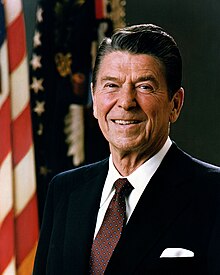
| ||
|---|---|---|
|
Personal life 33rd Governor of California
40th President of the United States Legacy |
||
Ronald Reagan, the 40th President of the United States, oversaw the United States response to the emergence of the HIV/AIDS crisis during the 1980s. His actions, or lack thereof, have long been a source of controversy and have been widely criticized by LGBT and AIDS advocacy organizations.
AIDS was first medically recognized in 1981, in New York and California, and the term AIDS (acquired immunodeficiency syndrome) was created in 1982 to describe the disease. Lester Kinsolving, a reporter in the White House press pool, attempted to ask many early questions on AIDS, but his questions were not taken seriously. The 1985 illness and death of Rock Hudson marked a major turning point in how the American public viewed AIDS, with major policy shifts and funding increases coming in the wake of his death. Reagan did not publicly acknowledge AIDS until 1985 and did not give an address on it until 1987.
Reports on AIDS from Surgeon General C. Everett Koop in 1986 and James D. Watkins in 1988 were provided to the Reagan administration and offered information about AIDS and policy suggestions on how to limit its spread. However, the administration largely disregarded the recommendations in the reports. Towards the end of his presidency in 1988, Reagan took some steps to implement policies to stop the spread of AIDS such as notifications to those at risk of infection and barring federal discrimination against civilian employees with AIDS, though these actions have been criticized as not wide enough in their scope and too late in the crisis to prevent the deaths of tens of thousands of Americans.
As gay men, transgender women, and LGBT people in general were disproportionately afflicted with AIDS, some critics have suggested that Reagan's lack of action was motivated by homophobia. A belief among Christian conservatives at the time, including those in the White House and activists close to it, held that AIDS was a "gay plague" and any response to it should emphasize homosexuality as a moral failing, though there is little consensus on to what extent Reagan himself took to these views. Reagan's response to AIDS is generally viewed negatively by LGBT and AIDS activists, as well as epidemiologists. Criticism of Reagan's AIDS policies led to the creation of art condemning the government's inaction such as The Normal Heart, as well as invigorating a new wave of the gay rights movement.
© MMXXIII Rich X Search. We shall prevail. All rights reserved. Rich X Search


